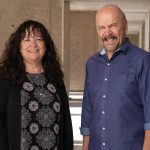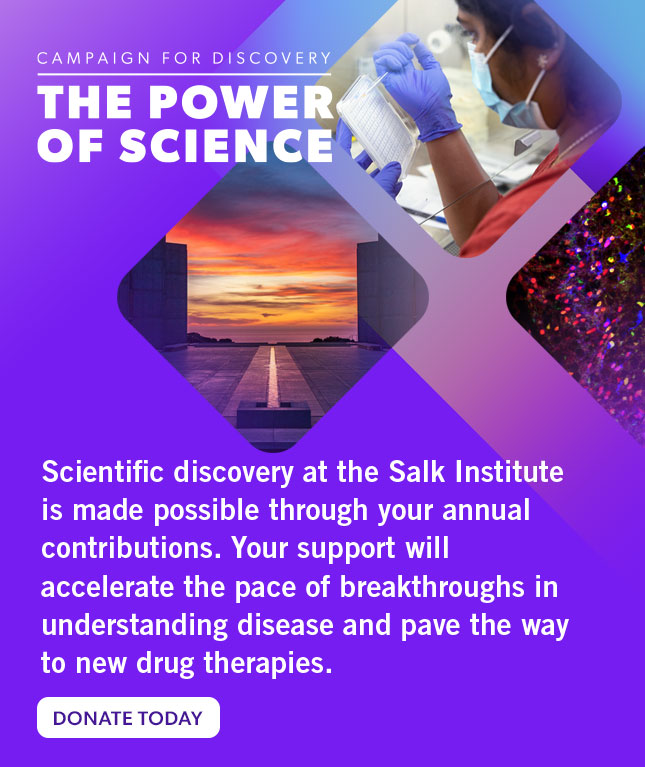As a child, Katia Troha would mix chemicals from her bathroom to see how they would react. Not all her concoctions worked out, and one day she had to be rushed to the hospital, as her hands had turned dark brown. Despite this setback, her love of experiments continued, and she is now a postdoctoral researcher in the lab of Professor Janelle Ayres, where she studies asymptomatic infections, in which an animal infected with a virus or bacteria doesn’t have any symptoms.
Growing up in Lima, Peru, Troha’s love of science was fueled by watching documentaries where she learned about groundbreaking studies like the first cloned mammal, Dolly the sheep. She was excited to see how this technology would be used for the benefit of human health. Although there were no scientists in her immediate family, Troha knew she wanted to become a scientist to learn all she could about genetics.
When Troha was 14, her family moved to the United States in search of a better life. In college at UC Berkeley, Troha majored in genetics, and during one of her classes she met Sir Ian Wilmut, the English embryologist who led the research group that cloned Dolly. Although nervous, she worked up the courage to ask him something she had always wondered about: Why had he used a mammary gland cell to clone Dolly?
“I was expecting a great scientific explanation, but instead he stated that his funding had come from a milk company. So, the mammary cell was used just because it produced milk,” says Troha. “His response was eye-opening, and I learned a little bit more that day about how science works.”
After college, Troha pivoted her focus when she joined a UC Berkeley lab as a technician, where she studied immunity and infectious microbes, small organisms like bacteria that can cause disease. “There’s this dance between microbes and animals. Sometimes this interaction isn’t good, and people get sick, but other times we gain multiple benefits from these microbes,” she says.
It was in that lab that Troha first met now Salk Professor Janelle Ayres, who was a postdoctoral fellow at the time. Ayres introduced Troha to the study of asymptomatic infections and mentored her on her journey to graduate school.
“During an asymptomatic infection, you can maintain your health, so you don’t feel or look sick,” says Troha. “One of the easiest examples comes from the pandemic. While some people who tested positive for COVID-19 were sick with symptomatic infections and had to be hospitalized, other people were asymptomatic and did not have any symptoms at all.”
Troha completed her PhD in immunology and infectious disease at Cornell University in Ithaca, New York, studying how fruit flies respond to infections. But she longed to return to her work with Ayres. After her PhD, Troha reached out to Ayres to see if she could join her lab to continue studying asymptomatic infections at the Salk Institute.
“I had always heard about the Salk Institute, and the amazing science that is conducted there,” says Troha. “To be honest, I was also ready to leave behind the winters in upstate New York. I don’t miss those emails from the administration telling us that it’s unsafe to be outside because it’s so cold.”
In Ayres’ lab at Salk, Troha now examines how different diets can affect the ability of a mouse to survive an infection. She uses an infectious microbe that initially infects the gut and then replicates to spread throughout the whole body. Her goal is to discover dietary interventions that improve health and increase survival during these infections.
Troha has discovered that some diets are able to make the kidneys grow during the infection. Kidneys are typically thought of as a filtration organ, but they also play a role in the response to infection. She believes that the increase in kidney size during infections could help the body tolerate the invader. Although her findings have not yet been published, she is excited about the impact her work could have on the field of infectious diseases and health research.
She was recently named a 2022 Leading Edge Fellow, which is a professional development fellowship aimed at improving the gender diversity of life sciences faculty across the United States. As a fellow, Troha will be able to present her work, meet and connect with other fellows, and receive mentorship and career development training from world leaders in biomedical research. “The fellowship will allow me to learn more about what it takes to become a professor in science and how to develop my research vision,” she says.
Although she now conducts her experiments in a state-of-the-art Salk lab, Troha still reminisces about the days when she mixed chemicals in her home. “Perhaps it’s best that I now wear gloves to pursue my scientific explorations,” she laughs.




























































